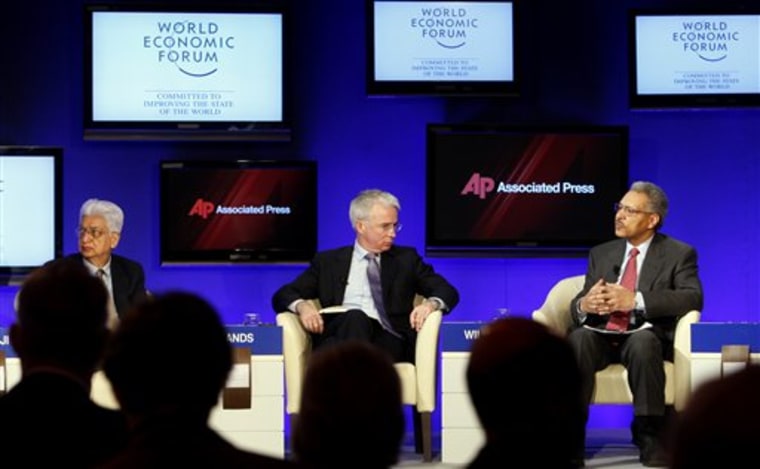The world's foremost gathering of business and government leaders wrapped up a five-day meeting Sunday with widespread agreement that a fragile recovery is under way but no consensus on what's going to spur job growth and prevent another global economic meltdown.
In a group of big egos and many power players attending the annual World Economic Forum, there was even some humility and a realization that overcoming the first global financial crisis is uncharted territory.
The gathering of some 2,500 VIPs in this Swiss alpine resort saw much spirited debate on whether more regulation is needed for the financial industry and how to lower global unemployment and find ways to ensure the nascent recovery is kept on course through 2010.
The atmosphere of doom and gloom that pervaded last year's forum, which took place at the height of the economic crisis, was replaced this year by a feeling of some satisfaction that a modest recovery is under way but uncertainty about the way forward and how banks should respond.
Deutsche Bank chief Executive Josef Ackerman told an AP-sponsored closing panel that the worst of the financial and economic crisis had been managed "quite successfully" but decision-makers now had a tough choice: "Should we take more risk, be a creative force for growth, or should we focus on security?"
Peter Sands, the CEO of Britain's Standard Chartered Bank, said at the panel that the right balance must be struck "between making a safer banking system and a financial system that can support the sort of dynamism and growth in job creation."
"Get it wrong one way and we risk a new crisis; get it wrong the other way and we'll take the steam out of the recovery and reduce the chances of creating new jobs," he said.
At the same time, Sands said, everyone must have "a degree of humility about what we actually know, and how confident we can be, that the ideas we're going to put in place are going to have the consequences that we thought they were going to have."
At Davos, the pendulum swings between a focus on the economy and other global issues.
The spotlight at past forums has been on celebrity guests such as Angelina Jolie and Bono, but this year it fell on the big bankers and government financial regulators. Many participants remarked upon the absence of high-profile figures from the Obama administration. The highest-ranking was Lawrence Summers, director of the White House National Economic Council.
In the keynote speech, French President Nicolas Sarkozy called for a return to ethics and morality in business and gave a broad riposte to free-market capitalism.
Klaus Schwab, the forum's founder, ended the meeting with a call to the business and government leaders to reflect "on values" and social responsibility.
Sarkozy told international bankers and CEOs just what they didn't want to hear: Brace for bonus curbs, tighter banking regulations and new bookkeeping rules. He echoed rallying cries of workers from the United States to Europe and Asia, and hours later, President Barack Obama also called for reforms to Wall Street.
Perhaps the most important meeting was unscheduled. It came Saturday on the sidelines of the forum when government regulators, finance ministers and central bankers from the U.S. and Europe laid out their financial reform plans during a two-hour meeting with bank executives.
Sands called the discussions at this and other meetings "very constructive" but said: "They haven't in a sense solved the issues, but they certainly, I think, pushed them forward."
Ackerman praised the major economic players for expanding their Group of Eight to the Group of 20. He said there should be a business group of 20 to work alongside them and focus on business issues.
With China and India spurring the global economy, Azim Premji, chairman of Wipro Limited, India, a global communications company, predicted that the difference between growth rates between the developing and developed worlds "are increasingly going to become larger."
The result, he told the AP-sponsored panel, is that richer countries will "more aggressively" invest in emerging markets in order to maintain their own growth, which will be "good for the emerging world."
Muhammad Yunus, managing director of the Grameen Bank, which pioneered microcredit, said in an AP interview that "this is a good time to redesign the entire financial system."
"Big guys are not the big sufferers," he said. "Big sufferers are the small guys who lost their jobs, who lost their food, who lost their livelihood."
